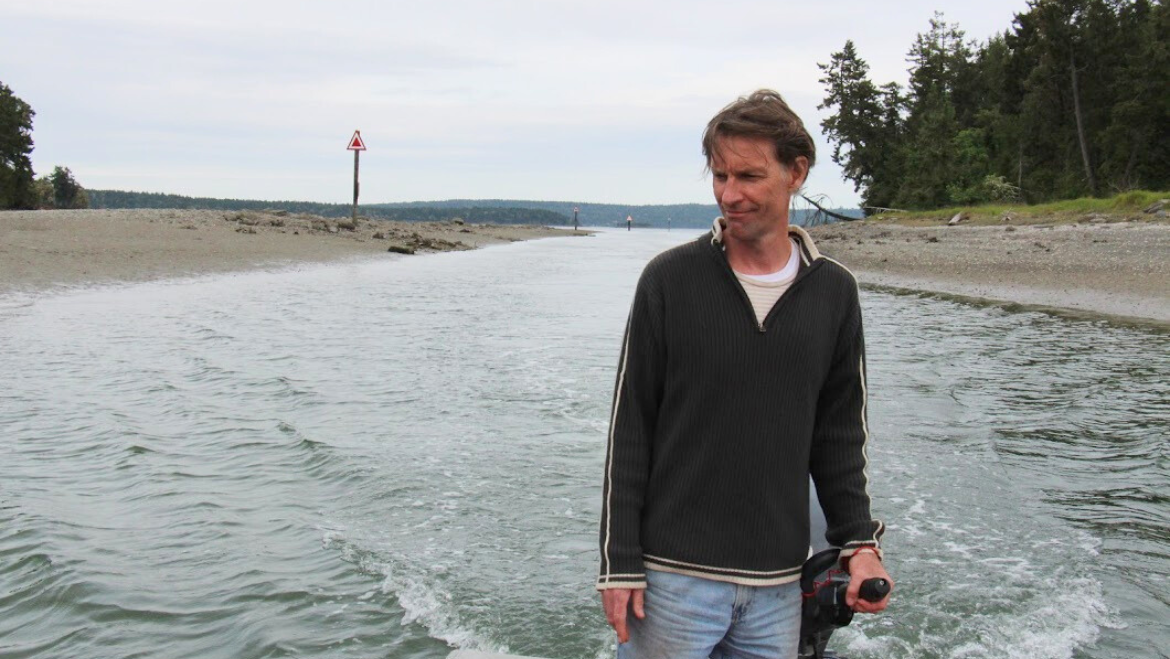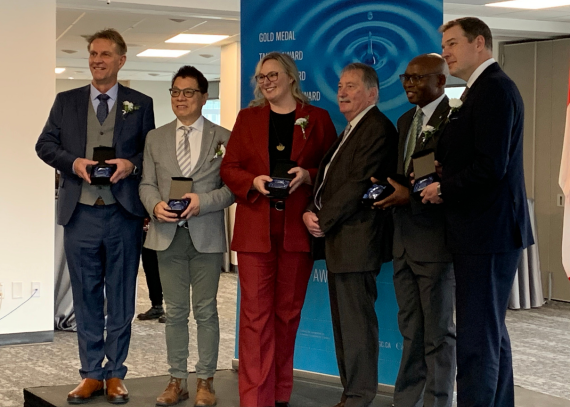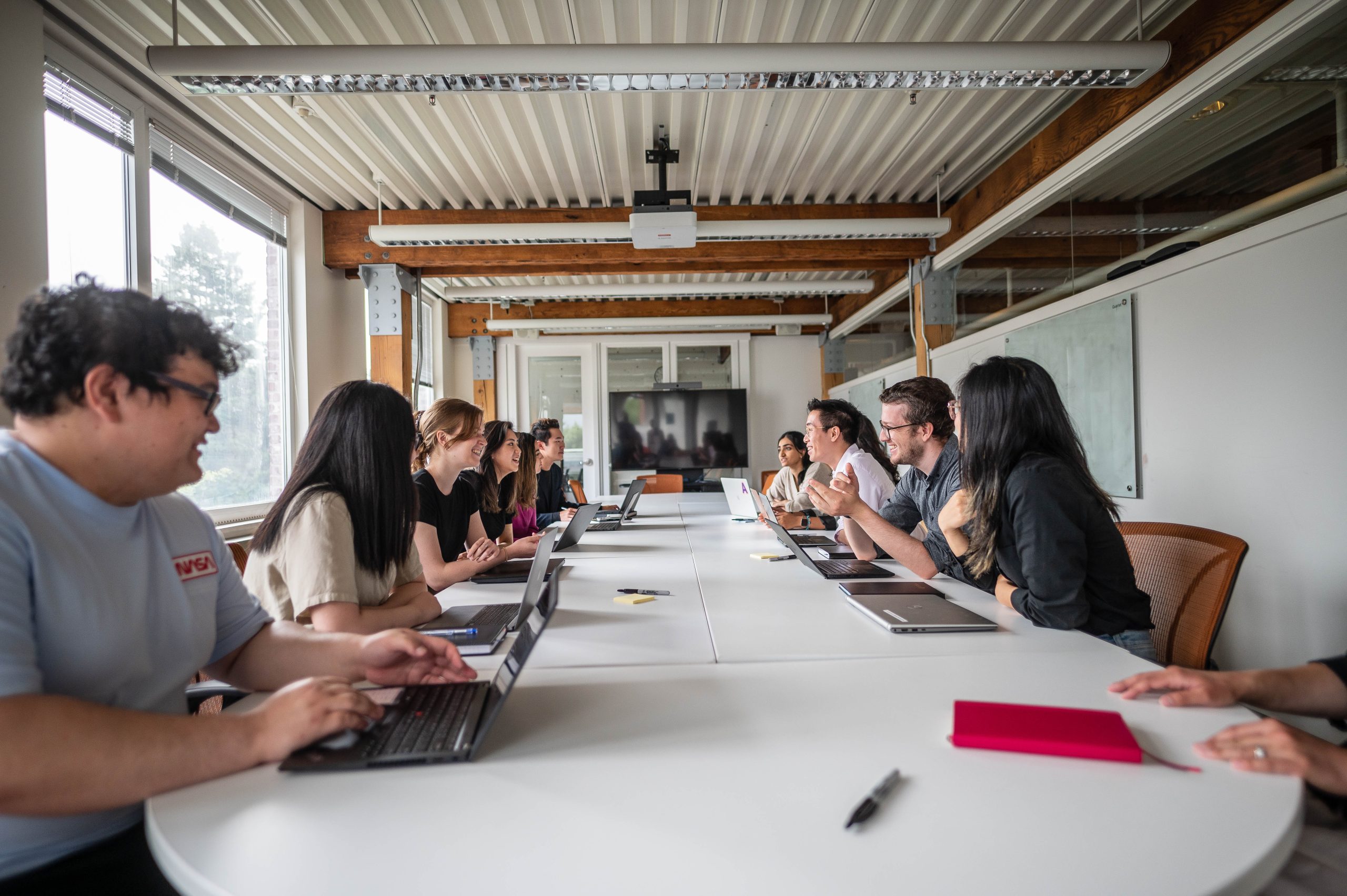

Photo Credit: Brian Thom
UBC Anthropologist Dr. Andrew Martindale has been awarded the nationally prestigious Social Sciences and Humanities Research Council of Canada (SSHRC) Impact – Connection Award 2023 for his scholarship in partnership with Indigenous communities. This work focuses on issues that respond to historic and ongoing colonial processes beginning with the theft of Indigenous land and including the development of Indian Residential Schools.
Bestowed during a special parliament session once a year, the Connection Award ($50,000) recognizes a SSHRC-funded individual that promotes the exchange of research knowledge within and beyond the academic community. It is awarded to researchers whose initiatives have greatly influenced intellectual, cultural, social, and economic aspects of society through scholarship.
Content Warning: The following includes discussion of Indian Residential Schools and may cause trauma for Survivors and their families and communities. If you are in need of support, please access the following resources and take care of yourself and each other.
View support for residential school survivors and families
“My scholarship is a small part of the larger effort to describe the history of our country truthfully and to help those who were and continue to be disenfranchised by colonial violence and racism and who have been seeking redress. My work exists in partnership with and by permission of Indigenous communities. While I am grateful for this honour, these are the people who deserve the recognition more than I. Most of those are Indigenous people who would not qualify for SSHRC awards. I have asked the Spune’luxutth (Penelakut) Elders Committee to accept this award and use the funds in their efforts to support survivors of residential schools and in their search for missing children.”
Dr. Martindale’s work is intertwined with material legacies of people of and on the Pacific coast. “I’ve been fortunate to work in partnership with Penelakut, Tsimshian and Musqueam people as friends, colleagues, and teachers. My endeavors as a result inhabit intersections of colonialism and race, of materiality and text, of knowledge and experience, of landscapes and sentience. I think that seeking to work collaboratively with Indigenous communities as a non-Indigenous person creates a fundamental interdisciplinarity between the traditions of western and Indigenous scholarship.”
Dr. Martindale’s scholarship focuses on explorations of material landscapes using archaeological methods and historical landscapes recorded in the literature of Indigenous oral records. “This work has demonstrated the capacity of Indigenous oral records to accurately record millennia of history, something that while obvious to Indigenous communities is less well understood in the non-Indigenous settler-colonial state. These results also cast some light on the vulnerabilities of different knowledge frameworks, including those of science, to ethnocentrism in the description and explanation of history. My work explores these in both social theory and, increasingly, the interpretation of archaeology in Canadian legal history of Aboriginal rights and titles and in the realm of Indigenous law – the evaluation of rights within Indigenous legal systems.”
He is a member of the National Advisory Committee on Missing Children and Unmarked Burials and the Canadian Archaeological Association’s Working Group on missing children and unmarked burials, which developed best practice guidance for Survivors and their families in the search for missing children from residential schools. He also works with the Musqueam Indian Band to teach communities that are developing search capacities. He is also a member of the UBC team that is part of a new $30 million NSF Centre for Braiding Indigenous Knowledges and Science led by Dr. Sonya Atalay from the University of Massachusetts, as well as UBC’s Indigenous/Science research initiative.
We spoke to Dr. Martindale to learn more about his nationally influential SSHRC-funded research.
Can you share with us a brief description of your SSHRC-funded initiative?
My work exists in the foundational trauma of our country, and I have mixed feelings about receiving recognition for exploring this difficult issue. I focus on two areas that respond to the original theft of land and resources from Indigenous communities. Research grants are not the best way to respond to these issues, but often Indigenous communities lack other options to advance this work.
First, I work with archaeological and oral records to assist communities in creating legal defenses against colonial incursion onto their territory. These communities do not need me to help them understand their history, but my scholarship is deployed to work in colonial contexts (such as Canadian courts or in governmental policy debates) to assemble arguments that these institutions seem to respect more than Indigenous scholarship. I also assist in compiling archival evidence to demonstrate the workings of Indigenous legal systems, which are the more appropriate venue for identifying Indigenous rights.
In the second area, I work with survivors of Indian Residential Schools, which were created in part to facilitate the theft of land and resources, to locate missing children using archaeological methods. This is an ongoing trauma in our country, one that will take decades to address. It is important to note that, until recently, neither UBC nor SSHRC supported such work well and there still are institutional barriers to Indigenous communities seeking to conduct scholarship in these areas in ways that are appropriate to their sovereignty and jurisdiction. Again, while I am grateful for this acknowledgement, I hope it helps to prompt our institutions to evaluate their own colonial structures, work that has been advanced considerably at UBC with the Indigenous Strategic Plan.
How did you become interested in this area of study?
I began my graduate work in conversation with the traditional leadership of the communities I now work with at Lax Kw’alaams and Metlakatla – indeed, I sought their permission to conduct research with them before accepting a graduate position, something that was considered unusual at the time but which was clearly the only ethical choice. When I came to UBC, I felt I inherited our past institutional responsibilities; particularly our relationship with Musqueam. In these communities, I have benefited from the patient guidance of Indigenous scholars and knowledge holders who saw value in analyzing material landscapes and archival records using disciplinary frames in universities like UBC. They have directed me toward developing research that addresses some of their deep concerns: defending their lands and waters and finding their missing children. I am grateful for the honour they have shown me in inviting me to work with them.
Archaeology is at the core of this work, not because we are especially suited to it or insightful but, and I am only joking a little bit here, because archaeology is laborious and fairly boring. It requires long periods of working in Indigenous lands closely with Indigenous people and this has permitted the development of respectful relations that are the true strength of our discipline. Fortunately, a new generation of Indigenous scholars is becoming archaeologists, transforming our scholarship and improving our ability to understand the past.
Why is this work important? Especially with regards to Indigenous anthropology or archaeology?
Many non-Indigenous Canadians have only recently realized that our country is not what we have been taught. We are not a just society, but rather one that engaged in genocide, cultural and otherwise. The colonial processes that created this remain active among us today, so this is not just a historical issue. As many Indigenous people have noted, we must have truth before reconciliation. My scholarship is a small part of that more significant effort to describe the history of our country truthfully and to locate those who were targeted by its violence and whose survivance represents, in my view, our collective future.
“My work exists only in partnership with and by permission of Indigenous communities. While I am grateful for this honour, these people deserve the recognition more than I. In an ideal future, this research would be primarily conducted by Indigenous scholars; much of my work focuses on training and capacity building.”
My expertise is largely technical, but these are not issues for which there is a technical solution. For example, we can use archaeological and geophysical methods to locate children missing from residential schools, but we already know from the testimony of Survivors of this truth. As important as it is, our goal should not stop with finding them, but instead strive to build the society that could have existed had it not been for residential schools, had these children not been ‘missing’, which is a euphemism. They did not go missing, they died in care; some were killed. This is our history. Archaeology can help, but it alone will not achieve that larger ambition. It is painful and traumatic, but our only path ahead is to understand the reality of our history and our society. There are many people, Indigenous and non-Indigenous who are doing this good work, who deserve this recognition. We are stronger when we help each other.


From left, Andrew Martindale, Kang Lee, Jessica Davis, Ted Hewitt (SSHRC Director), Chidi Oguamanam and Jeremy de Beer at the annual SSHRC Impact Awards.
What are some helpful resources we (the UBC community) should use to learn more about Indigenous history in Canada and beyond?
UBC’s community is diverse. Its Indigenous members already have a rich understanding of their pasts and the ongoing effects of colonialism. Their scholarship is essential to our collective knowledge. Although it is an important conversation, the colonial context is simply one facet of Indigenous history and Indigenous people and cultures are extraordinary in many other ways. Non-Indigenous members of UBC have many resources to consult, perhaps the most comprehensive and accessible being the six volumes of the Truth and Reconciliation Commission (2015), which should be required reading nationwide. There are resources emerging from the National Centre for Truth and Reconciliation, including those from UBC’s Dialogue Centre, and the National Advisory Committee on Missing Children and Unmarked Burials. UBC has a powerful resource in its Indigenous Strategic Plan and its companion self-assessment tool.
“Indigenous people are frequently asked to guide or educate non-Indigenous Canadians on this history, but this is unfair. It is our responsibility to learn, not Indigenous peoples’ obligation to teach. Much of the space of that exploration is internal – how do we as non-Indigenous Canadians manifest and perpetuate the legacies of colonialism? It is tempting for beneficiaries of violence and inequality to ignore it; we should resist that temptation. Social sciences and the humanities can explore this dynamic.”
Non-Indigenous Canadians need to understand the role of non-Indigenous people and their institutions in this history of violence and trauma – an understanding that is our obligation to pursue and address.
Learning is essential especially with the emergence of performative acknowledgement of Indigenous rights, which tends to redirect the conversation to the concerns of non-Indigenous people. I can paraphrase TRC Commissioner Murray Sinclair who noted that education created much of this trauma, it might provide a path out of it. Non-Indigenous Canadians are perhaps confounded by the dissonance between what we thought our country was and what we know it is – we are not the country of our aspirations, but we might become so if we listen to the guidance of Indigenous survivors, their families, communities, and scholars.


